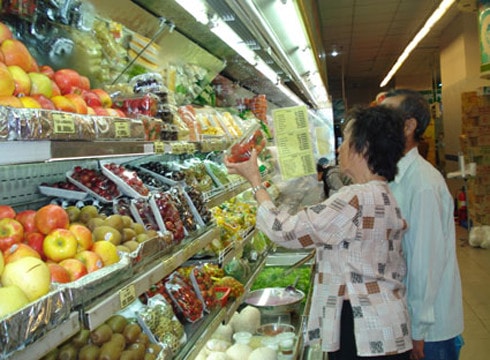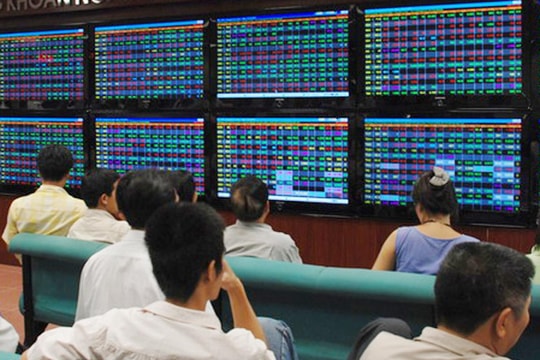Vietnamese businesses are at a disadvantage in connecting supply and demand.
Manufacturers and distributors still do not really have a common voice to effectively connect supply and demand of goods.
Nowadays, the market has more and more distributors and distribution systems both foreign and domestic. However, there is still no common voice between manufacturers and distributors to effectively connect supply and demand of goods. Enterprises are still at a disadvantage when they want to bring goods into distribution channels.
Ngoc Uyen production facility, belonging to Ham Kiem Dragon Fruit Production Service Cooperative (Binh Thuan) is one of the first dragon fruit wine production facilities in this locality. The product has been registered for quality and copyright.
 |
| Bringing goods into supermarkets by Vietnamese businesses still faces many obstacles. (Illustration: Internet) |
However, Ms. Ho Thi Bach Hoang, Director of this facility, said that since its launch, although the product has been favored by customers, due to the lack of distribution channels, it is only available at some rest stops and introduced at resorts, and has not reached a large number of consumers.
“At rest stops, the company’s products cannot be priced. The distribution partner sees that the products are not the same type, so they import them but decide on different prices. If the products can be brought to supermarkets, there is a high chance that the products will have better prices because supermarkets have price ranges anyway,” Ms. Hoang explained.
Ms. Nguyen Thi Nga, Chairwoman of the Board of Directors of Viet Herbs Joint Stock Company, said that the path to finding a distribution channel for the company's products is still too arduous. The products of this enterprise are herbal teas from passionflower, mountain noni fruit, Japanese ginger tea... all of which are beneficial for health.
Viet Herbs Company also sent product profiles to many supermarket chains, then had to wait for a whole month for the answer to be rejected. However, what she was worried about was that the supermarket refused without telling the business why, and the conditions to meet the conditions to enter the supermarket were also not disclosed.
According to Ms. Nga, to produce herbal tea products, the company is initially cooperating with the Vietnam Medicinal Herbs Association and the Ho Chi Minh City Farm Association to cooperate with growers to produce raw materials to ensure the quality of its products.
“In reality, agricultural products often cannot be fully controlled to comply with the production process. Therefore, the company signs contracts with crop management companies, seed suppliers and producers so that they can control the quality, then they buy back from farmers. This link is stronger because there is a business representing the distributor to directly manage the farmers' production process,” said Ms. Nga.
Ngoc Uyen Production Facility and Viet Herbs Joint Stock Company are just two of thousands of manufacturers struggling to find distribution channels to bring their products to the market, especially to foreign distribution systems. Although the products are new and unique, the road to reaching widespread consumers is still long.
According to statistics from the Supermarket Suppliers Club, the total discount of Vietnamese retail systems is the highest at 10%, but all foreign retail systems are from 10% -30%. However, in reality, businesses reflect that the average discount rate at supermarkets is currently fluctuating from 20% - 25%. Despite the high discount rate, many businesses still try to queue up to enter the supermarket, which is also the reason for supermarkets to consolidate their power.
Therefore, according to Ms. Le Thi Thanh Lam, Deputy General Director of Saigon Food Joint Stock Company, small and medium-sized enterprises negotiating with distributors, especially foreign supermarkets, is a wrong choice. It is necessary to cooperate and link together through intermediaries. The State needs to provide support and guidance, and small enterprises must link together to negotiate with foreign supermarkets to avoid being squeezed by high discount rates.
“The government needs to organize more seminars to connect and share information so that small and micro businesses know where they are, what supermarkets currently need, and improve their ability to negotiate with large supermarkets. Currently, small businesses negotiating with large supermarkets is a unilateral form,” Ms. Lam shared.
According to many opinions of businesses and associations, to solve the problem of supply and demand of goods, the state needs to quickly invest in expanding and developing the distribution system, while at the same time promoting domestic trade, creating conditions for Vietnamese goods to develop.
Management agencies need to come up with appropriate policies and general regulations on increasing annual distributor discounts, while also creating a bridge for businesses in different industries to join forces to implement programs to bring Vietnamese goods to consumers.
Only then will Vietnamese businesses not be "outdone" by the current flood of foreign goods in supermarkets./.
According to VOV





